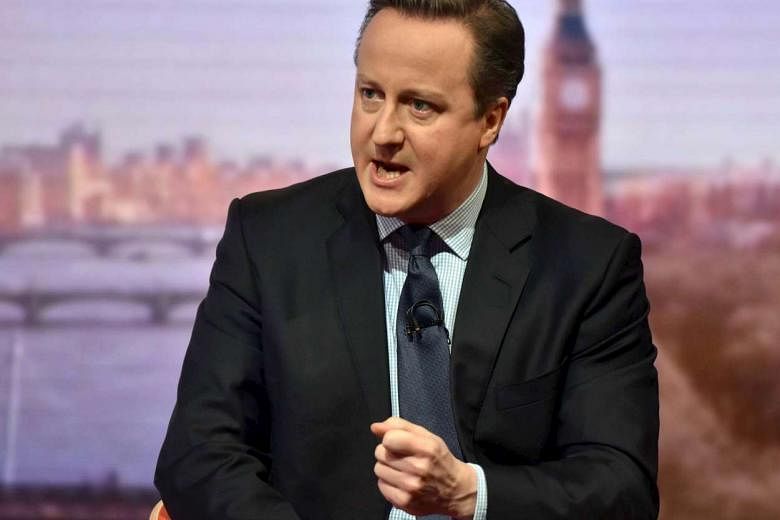LONDON (AFP) - Prime Minister David Cameron made a last-ditch appeal to London Mayor Boris Johnson Sunday to support Britain staying in the EU as battle lines hardened ahead of a June 23 membership referendum.
Mr Cameron used a BBC interview to make a direct appeal to the charismatic mayor Johnson, who is expected to declare his position later on Sunday in a move which could transform the out campaign if he backs them.
Mr Johnson's decision is seen as an important moment in the referendum battle and if media reports suggesting he is set to back Brexit are correct, it would also deal a major blow to Mr Cameron two days after he nailed down a deal in Brussels Friday.
"I would say to Boris what I say to everybody else which is we'll be safer, we'll be stronger, we'll be better off inside the EU," the British premier said.
"I think the prospect of linking arms with Nigel Farage and George Galloway and taking a leap into the dark is the wrong step for our country."
Mr Farage, the leader of the anti-EU UK Independence Party, and Mr Galloway, a veteran left-winger and former lawmaker, are both polarising figures backing the campaign to leave the European Union.
Mr Johnson, by contrast, is widely popular even with those who do not share his political views, thanks to his witty soundbites and shambolic appearance.
Nicknamed "BoJo", he is also one of the favourites to succeed Mr Cameron, who will not stay on beyond the next election in 2020.
This is despite Mr Johnson once claiming his chances of leading the country were on a par with "my being reincarnated as an olive".
Mr Cameron, who wants to stay in the European Union, secured a deal late on Friday (Feb 19) to reset Britain's ties with the 28-nation bloc after two days of marathon talks in Brussels.
He then flew straight back to London to meet his Cabinet and announce the date of the referendum on Saturday.
Six government ministers have come out in favour of leaving the bloc so far, including Justice Secretary Michael Gove, one of Mr Cameron's closest friends and allies.
Scottish First Minister Nicola Sturgeon confirmed on Sunday that she would back EU membership and told the BBC that any vote to leave would "almost certainly" trigger a fresh independence referendum.
Scotland backed remaining part of Britain in a referendum in 2014, despite Ms Sturgeon's ruling Scottish National Party (SNP) supporting independence.
Mr Cameron now faces a battle to keep his centre-right Conservative party together and convince voters that he has secured a good enough deal from Brussels for them to support continuing membership.
He used his BBC interview to stress arguments of safety and patriotism which are likely to feature prominently in the campaign to remain in the EU.
The Prime Minister emphasised repeatedly that leaving the EU would be a "leap in the dark", adding: "I love this country so much... that's what this is about".
Mr Cameron also confirmed that he would be putting forward a new law soon "to make clear that the British parliament is sovereign" over Europe.
That could come as early as Monday, when he is due to address the House of Commons on the EU deal.
But in a move which highlighted the provisional nature of elements of the Brussels deal, Mr Cameron admitted that details of one of its key parts - limiting how much in benefits EU migrants can claim in Britain for their first four years in the country - had yet to be worked out.
A Survation/Mail opinion poll on Sunday, the first conducted since Mr Cameron's deal, indicated that 48 per cent of Britons did not want to leave the EU, 33 per cent did and 19 per cent were still undecided.

